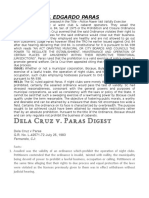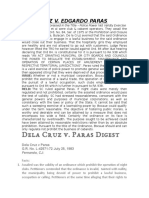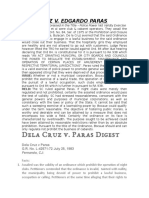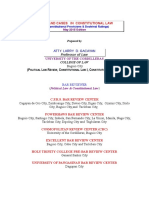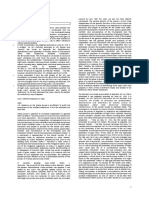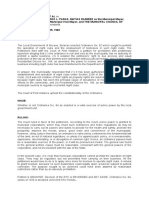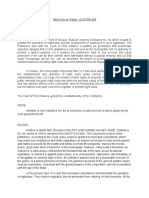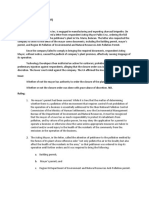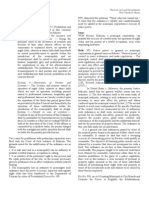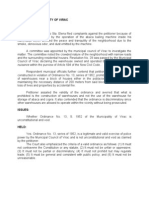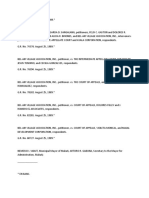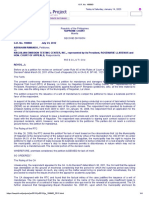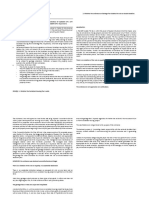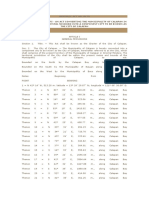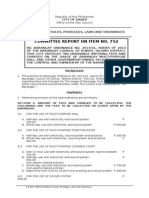0 ratings0% found this document useful (0 votes)
98 views12 pagesDigest Police Power
This document summarizes three Philippine Supreme Court cases related to the exercise of police power by local governments:
1) Dela Cruz v. Paras established that municipal councils have broad police powers to regulate establishments like nightclubs and cabarets, but cannot prohibit them outright. They may only regulate operations.
2) Salak v. PTC ruled that the opening of a street in Makati to traffic by the mayor was a valid exercise of police power, intended to relieve congestion and serve public convenience. Police power allows seizure of property without compensation if for health, safety or security.
3) Technology Developers v. Court of Appeals upheld a mayor's order to close a factory for polluting the area
Uploaded by
mai_uksCopyright
© © All Rights Reserved
We take content rights seriously. If you suspect this is your content, claim it here.
Available Formats
Download as DOC, PDF, TXT or read online on Scribd
0 ratings0% found this document useful (0 votes)
98 views12 pagesDigest Police Power
This document summarizes three Philippine Supreme Court cases related to the exercise of police power by local governments:
1) Dela Cruz v. Paras established that municipal councils have broad police powers to regulate establishments like nightclubs and cabarets, but cannot prohibit them outright. They may only regulate operations.
2) Salak v. PTC ruled that the opening of a street in Makati to traffic by the mayor was a valid exercise of police power, intended to relieve congestion and serve public convenience. Police power allows seizure of property without compensation if for health, safety or security.
3) Technology Developers v. Court of Appeals upheld a mayor's order to close a factory for polluting the area
Uploaded by
mai_uksCopyright
© © All Rights Reserved
We take content rights seriously. If you suspect this is your content, claim it here.
Available Formats
Download as DOC, PDF, TXT or read online on Scribd
You are on page 1/ 12
Page 1 of 12
Dela Cruz v. Paras, G.R. No. L-42571-72, July 25, 1983
Rationale: Municipal Corporations, when exercise of police power by a local government council is valid.
Police power is granted to municipal corporations in general terms as follows:
eneral power of council to enact ordinances and ma!e regulations. " #he municipal council shall
enact such ordinances and ma!e such regulations, not repugnant to law, as may be necessary to carry into effect
and discharge the powers and duties conferred upon it by law and such as shall seem necessary and proper to
provide for the health and safety, promote the prosperity, improve the morals, peace, good order, comfort, and
convenience of the municipality and the inhabitants thereof, and for the protection of property therein.$
%nder Republic &ct 'o. ()*, entitled &' &C# R&'#+' M%'+C+P&, -R C+#. /-&R01 &'0
C-%'C+,1 #23 P-43R #- R3%, #23 31#&/,+12M3'#, M&+'#3'&'C3 &'0 -P3R&#+-' -5
C3R#&+' P,&C31 -5 &M%13M3'# 4+#2+' #23+R R31P3C#+63 #3RR+#-R+&, 7%R+10+C#+-'.$ +ts first
section insofar as pertinent reads: #he municipal or city board or council of each chartered city shall have the
power to regulate by ordinance the establishment, maintenance and operations of night clubs, cabarets, dancing
schools, pavilions, coc!pits, bars, saloons, bowling alleys, billiard pools, and other similar places of amusement
within its territorial 8urisdiction.$
%nder the ,ocal overnment Code 9/&#&1 )):;, the 1angguniang /ayan cannot prohibit establishment
of cabarets.
#hus, a local government council cannot prohibit the establishment of nightclubs and cabarets< it may
only regulate their operations.
5&C#1: Petitioners 6icente de la Cru=, et al. had been previously issued licenses by the Municipal Mayor of
/ocaue. Petitioners alleged that they had invested large sums of money in their business. #hat the night clubs are
well lighted and have no partitions, the tables being near each other. #hat the petitioners, owners>operators of
these clubs do not allow the hospitality girls therein to engage in immoral acts and to go out with customers. #hat
these hospitality girls are made to go through periodic medical chec! " ups and not one of them is suffering from
any venereal disease. &nd that those who are found to be infected with venereal disease are not allowed to wor!.
#hat the crime rate there is better than in other part of /ocaue or in other towns of /ulacan. 5urthermore,
petitioners are asserting that they had followed all the re?uirements in order for their business would be
considered legal.
2owever, the Municipality of /ocaue had passed an ordinance which is !nown as Prohibition and
Closure ordinance of /ocaue, /ulacan.$ that prohibits the establishment of night club, cabaret or dance hall and
orders for its closure. 2ence, the petitioners alleged that their rights to due process and e?ual protection of the
laws has been violated as the licenses previously given to them was in effect withdrawn without 8udicial hearings.
#hus, the filing of the petition for certiorari with preliminary in8unction to review the decision of the Court
of 5irst +nstance of /ulacan. 4herein, the 2onorable 3dgardo ,. Paras, Matias Ramire= as the Municipal Mayor,
and the Municipal Council of /ocaue, /ulacan are the respondent to the case.
+11%3: 4-' -rdinance no. *@ is constitutionalA
R%,+': '-, Police power is granted to municipal corporations in general terms as follows: eneral power of
council to enact ordinances and ma!e regulations. " #he municipal council shall enact such ordinances and ma!e
such regulations, not repugnant to law, as may be necessary to carry into effect and discharge the powers and
duties conferred upon it by law and such as shall seem necessary and proper to provide for the health and safety,
promote the prosperity, improve the morals, peace, good order, comfort, and convenience of the municipality and
the inhabitants thereof, and for the protection of property therein.$ &nd it is a general rule that ordinances passed
by virtue of the implied power found in the general welfare clause must be reasonable, consonant with the general
powers and purposes of the corporation, and not inconsistent with the laws or policy of the state. +f night clubs
were merely then regulated and not prohibited, certainly the assailed ordinance would pass the test of validity.
#hus, a local government council cannot prohibit the establishment of nightclubs and cabarets< it may
only regulate their operations.
Page 2 of 12
Sa!!ala! v. "#C, 17$ SCR# 179 %1989&
Rationale: ,ocal overnment< Police Power< #he -pening of -rbit 1treet to traffic by the Mayor was warranted by
the demands of the common good and is a valid exercise of police power. &s asserted in 1anggalang, the opening
of 7upiter 1treet was warranted by the demands of the common good, in terms of traffic decongestion and public
convenience.
Police Power, unli!e the power of eminent domain, is exercised without provisions for 8ust
compensation.
&rt. @)B. 4hen any property is condemned or sei=ed by competent authority in the interest of
health, safety or security, the owner thereof shall not be entitled to compensation, unless he can show
that such condemnation or sei=ure is un8ustified. +t may not be done arbitrarily or unreasonably. /ut the
burden of showing that it is un8ustified lies on the aggrieved party.
5&C#1: #he Mayor of Ma!ati directed /elC&ir 6illage &ssociation 9/&6&; to opening of several streets to the
general public, after a series of developments in =oning regulations. &ll but 7upiter 1t. was voluntarily opened. #he
strong opposition later gave way when the municipal officials forceCopened the gates of said street for public use.
#he area ceased to be purely residential. &ction for damages was brought against &yala Corporation and /&6&
for alleged breach of contract, to maintain the purely residential status of the area. -ther similarly situated also
filed their respective cases. &ll were dismissed in the trial court. #he Court of &ppeals affirmed the said dismissals.
+11%3: 4-' the opening of 7upiter 1treet is within the scope of exercise of police power by the Mayor of
Ma!ati.
R%,+': .es, the opening of 7upiter 1treet was warranted by the demands of the common good, in terms of
traffic decongestion and public convenience. #here is no merit in /&6&Ds Claims that the demolition of the gates at
-rbit and 7upiter 1treets amounts to deprivation of property without due process of law or expropriation without
8ust compensation. #here is no ta!ing of property involved here.
Technology Developers v. Court of Appeals, E() 1CR& EF: 9E((E;
'a()s*
#echnology 0evelopers +nc. is engaged in manufacturing and exporting charcoal bri?uette. -n5ebruary
EB, E(*(, they received a letter from respondent &cting Mayor Pablo Cru=, ordering the fullcessation of the
operation of the petitionerDs plant in 1ta. Maria, /ulacan. #he letter also re?uested thecompany to show to the
office of the mayor some documents, including the /uilding permit, mayorDspermit, and Region +++CPollution of
3nvironmental and 'atural Resources &ntiCPollution Permit.1ince the company failed to comply in bringing the
re?uired documents, respondent &ctingMayor, without notice, caused the padloc! of companyDs plant premises,
effectively causing stoppage of its operation.
#echnology 0evelopers then instituted an action for certiorari, prohition, mandamus withpreliminary
in8uction against respondents, alleging that the closure order was issued in grave abuse of discretion. #he lower
court ruled against the company. #he C& affirmed the lower courtDs ruling.
"ssue*
4hether or not the mayor has authority to order the closure of the plant.
4hether or not the closure order was done with grave abuse of discretion.
Rul+!*
E. 'o mayorGs permit had been secured. 4hile it is true that the matter of determining whether there is a
pollution of the environment that re?uires control if not prohibition of the operation of a business is essentially
addressed to the then 'ational Pollution Control Commission of the Ministry of 2uman 1ettlements, now the
3nvironmental Management /ureau of the 0epartment of 3nvironment and 'atural Resources, it must be
recogni=ed that the mayor of a town has as much responsibility to protect its inhabitants from pollution, and by
virtue of his police power, he may deny the application for a permit to operate a business or otherwise close the
same unless appropriate measures are ta!en to control and>or avoid in8ury to the health of the residents of the
community from the emissions in the operation of the business.
F. #he &cting Mayor, in the letter, called the attention of petitioner to the pollution emitted bythe fumes of
its plant whose offensive odor Hnot only pollute the air in the locality but alsoaffect the health of the residents in the
area,H so that petitioner was ordered to stop itsoperation until further orders and it was re?uired to bring the
following:
a./uilding permit<
b.MayorGs permit< and
c.Region +++C0epartment of 3nvironment and 'atural Resources &ntiCPollution permit.
). #his action of the &cting Mayor was in response to the complaint of the residents of /arangay uyong,
1ta. Maria, /ulacan, directed to the Provincial overnor through channels.
@. #he closure order of the &cting Mayor was issued only after an investigation was made.+tfound thatthe
fume emitted by the plant of petitioner goes directly to the surroundinghouses and that no proper air pollution
device has been installed. I.
Petitioner failed to produce a building permit from the municipality of 1ta. Maria, butinstead presented a building
permit issued by an official of Ma!ati.
Binay v. Domingo, FJE 1CR& IJ* 9E((E;
Page 3 of 12
'#C,S*
#he /urial &ssistance Program 9Resolution 'o. BJ " assisting those who only earn less than PF,JJJ>month of
burial assistance in the amount of PIJJ.JJ; made by Ma!ati Mayor 7e8omar /inay, in the exercise of the police
power granted to him by the municipal charter, was referred to the Commission on &udit after the municipal
secretary certified the disbursement of four hundred thousand pesos for its implementation was disallowed by said
commission of such disbursements because there cannot be seen any perceptible connection or relation between
the ob8ective sought to be attained and the alleged public safety, general welfare, etc. of its inhabitants. 2ence,
this petition revolving around the pivotal issue on whether or not Resolution 'o. BJ of the Municipality of Ma!ati is
a valid exercise of police power under the general welfare clause.
"SS-.*
4hether or not the Resolution KBJ, reenacted under Resolution KF@), is a valid exercise of Police Power under
the eneral 4elfare Clause
/.LD*
Resolution 'o. BJ of the Municipality of Ma!ati is a valid exercise of police power under the general welfare
clause. #he police power is a governmental function, an inherent attribute of sovereignty, which was born with
civili=ed government. +t is founded largely on the maxims, 1ic utere tuo et ahenum non laedas$ 9use your property
so as not to impair others; and 1alus populi est suprema lex$ 9the welfare of the people is the supreme law;. +ts
fundamental purpose is securing the general welfare, comfort and convenience of the people. Police power is the
power to prescribe regulations to promote the health, morals, peace, education, good order or safety and general
welfare of the people. +t is the most essential, insistent, and illimitable of powers. +n a sense it is the greatest and
most powerful attribute of the government. +t is elastic and must be responsive to various social conditions. #he
care for the poor is generally recogni=ed as a public duty. #he support for the poor has long been an accepted
exercise of police power in the promotion of the common good.
,#,.L 0S 1-N"C"P#L",2 3' 0"R#C
5&C#1: Complaints were received from residents of barrio 1ta. 3lena against the disturbance caused by the
operation of the abaca bailing machine inside the warehouse of petitioner which affected the peace and tran?uility
of neighborhood due to the smo!e, obnoxious odor and dust emitted by the machine. Resolution no. F( was
passed by respondent municipality declaring the warehouse owned and operated by the petitioner a public
nuisance within purview of &rticle B(@ of the Civil Code. &ccording to respondent municipal officials, petitionerDs
warehouse was constructed in violation of -rdinance 'o. E), series of E(IF, prohibiting the construction of
warehouses near a bloc! of houses either in the poblacion or barrios without maintaining the necessary distance
of FJJ meters from said bloc! of houses to avoid loss of lives and properties by accidental fire. -n the other hand,
petitioner contends that -rdinance 'o. E) is unconstitutional.
+11%3: 4-' the ordinance issued by the respondent municipality is valid.
R%,+': .31. -rdinance is valid. Court ruled that municipality of 6irac validly exercised police power. +t is a
settled principle of law that municipal corporation are agencies of the 1tate for the promotion and maintenance of
localCself government and as such are endowed with police power in order to effectively accomplish and carry out
the declared ob8ective of their creation. +ts authority emanated from the general welfare clause under the
administrative code which reads: #he municipal council shall enact such ordinances and ma!e such regulations,
not repugnant to law, as may be necessary to carry into effect and discharge the powers and duties conferred
upon it by law and such as shall seem necessary and proper to provide for the health and safety, promote the
prosperity, improve the morals, peace, good order, comfort and convenience of the municipality and the
inhabitants thereof, and for the protection of property therein and ,ocal overnment Code.
#L'R.D3 ,#N3, 4#LD31.R3 ,#N3 vs. /3N. G30. S#L0#D3R P. S3CR#,.S G.R. No. 115249 #u!us)
21, 1997
5&C#1: #he petitioners filed a petition for certiorari and prohibition assailing the constitutionality of:
9E; -rdinance 'o. EIC(F entitled:H &' -R0+'&'C3 /&''+' #23 12+PM3'# -5 &,, ,+635+12 &'0
,-/1#3R -%#1+03 P%3R#- PR+'C31& C+#. 5R-M 7&'%&R. E, E(() #- 7&'%&R. E,E((* &'0
PR-6+0+' 3L3MP#+-'1, P3'&,#+31 &'0 5-R -#23R P%RP-131 #23R3-5H
9F; -ffice -rder 'o. F), re?uiring any person engaged or intending to engage in any business, trade,
occupation, calling or profession or having in his possession any of the articles for which a permit is re?uired to be
had, to obtain first a MayorDs and authori=ing and directing to chec! or conduct necessary inspections on cargoes
containing live fish and lobster being shipped out from Puerto Princesa and,
9); Resolution 'o. )), -rdinance 'o. F entitled: H& R31-,%#+-' PR-2+/+#+' #23C&#C2+', &#
23R+', P-11311+', /%.+', 13,,+' &'0 12+PM3'# -5 ,+63 M&R+'3C-R&, 043,,+' &M%&#+C
-R&'+1M1$.
#he petitioners contend that the said -rdinances deprived them of due process of law, their livelihood,
and unduly restricted them from the practice of their trade, in violation of 1ection F, &rticle L++ and 1ections F and
: of &rticle L+++ of the E(*: Constitution and that the Mayor had the absolute authority to determine whether or not
to issue the permit. #hey also claim that it too! away their right to earn their livelihood in lawful ways< and insofar
as the &irline 1hippers &ssociation are concerned, they were unduly prevented from pursuing their vocation and
entering Hinto contracts which are proper, necessary, and essential to carry out their business endeavors to a
successful conclusion Public respondents overnor 1ocrates and Members of the 1angguniangC
Panlalawigan of Palawan defended the validity of -rdinance 'o. F, 1eries of E((), as a valid exercise of the
Provincial overnmentGs power under the general welfare clause< they li!ewise maintained that there was no
violation of the due process and e?ual protection clauses of the Constitution.
+11%3: 4hether or not the -rdinances in ?uestion are unconstitutional
Page 4 of 12
R%,+': '-, +n light then of the principles of decentrali=ation and devolution enshrined in the ,C and
thepowers granted therein to local government units under 1ection EB 9the eneral 4elfare Clause;, and under
1ections E@(, @@:9a; 9E; 9vi;, @I* 9a; 9E; 9vi; and @B* 9a; 9E; 9vi;, which un?uestionably involve the exercise of
police power, the validity of the ?uestioned -rdinances cannot be doubted.NNN1ec. EB.
eneral 4elfare O 3very local government unit shall exercise the powers expressly granted, those
necessarily implied there from, as well as powers necessary, appropriate, or incidental for its efficient and effective
governance, and those which are essential to the promotion of the general welfare. 4ithin their respective
territorial 8urisdictions, local government units shall ensure and support, among other things, the preservation
and enrichment of culture, promote health and safety, enhance the right of the people to a balanced ecology,
encourage and support the development of appropriate and selfCreliant scientific and technological capabilities,
improve public morals, enhance economic prosperity and social 8ustice, promote full employment among their
residents, maintain peace and order, and preserve the comfort and convenience of their inhabitants. 9emphasis
supplied;.+t is clear to the Court that both -rdinances have two principal ob8ectives or purposes: 9E; to establish a
Hclosed seasonH for the species of fish or a?uatic animals covered therein for a period of five years< and 9F; to
protect the coral in the marine waters of the City of Puerto Princesa and the Province of Palawan from further
destruction due to illegal fishing activities.+t imposes upon the sangguniang bayan the sangguniang panlungsod,
and the sangguniang panlalawigan the duty to enact ordinances to protect the environment and impose
appropriate penalties for acts which endanger the environment such as dynamite fishing and other forms of
destructive fishing and such other activities which result in pollution, acceleration of euthrophication of rivers and
la!es or of ecological imbalance.
#he petition is dismissed.
.R. 'o. EJ@:*B 7anuary F:, E((@
#L'R.D3 P#,#L"NG/-G, vs. /3N. C3-R, 3' #PP.#LS, R"C#RD3 CR"4"LL3, 1#R,"N #R#P3L,
C3R#63N #LC#S"D, PR"1","0# S.D3
5&C#1: -n 'ovember E:, E(*F, the 1angguniang Panlungsod of 0avao City enacted -rdinance 'o. )B), series
of E(*F otherwise !nown as the H3xpanded Poning -rdinance of 0avao City,H 1ection * of which states:
Sec. 8. USE REU!AT"#$S "$ C%& D"STR"CTS 'Sha(e( light re( in the E)pan(e( *oning +ap, -
AC%& District shall .e (ominantly for commercial an( compati.le in(ustrial uses as provi(e( hereun(er/
0.1 2uneral 3arlors4+emorial 5omes 6ith a(e7uate off street par8ing space 'see par8ing stan(ar(s of 3.D. 19:;,
an( provi(e( that they shall .e esta.lishe( not less than <9 meters from any resi(ential structures, churches an(
other institutional .uil(ings.
%pon prior approval and certification of =oning compliance by Poning &dministrator issued on 5ebruary
EJ, E(*: /uilding Permit 'o. *:JFI@ in favor of petitioner for the construction of a funeral parlor in the name and
style of Metropolitan 5uneral Parlor at Cabaguio &venue, &gdao, 0avao City. #hereafter, petitioner commenced
the construction of his funeral parlor. &cting on the complaint of several residents of /arangay &gdao, 0avao City
that the construction of petitionerGs funeral parlor violated -rdinance 'o. )B), since it was allegedly situated within
a IJCmeter radius from the +glesia ni Qristo Chapel and several residential structures, the 1angguniang
Panlungsod conducted an investigation and found that Hthe nearest residential structure, owned by 4ilfred .
#epoot is only * inches to the south. . . . .H
'otwithstanding the findings of the 1angguniang Panlungsod, petitioner
continued to construct his funeral parlor which was finished on 'ovember ), E(*:.
Conse?uently, private
respondents filed on 1eptember B, E(** a case for the declaration of nullity of a building permit with preliminary
prohibitory and mandatory in8unction and>or restraining order with the trial court.
+11%3: 4hether or not the construction of the 5uneral Parlor violated the City -rdinace )B) otherwise !nown as
the H3xpanded Poning -rdinance of 0avao City$A
R%,+': 'o, +n the case at bar, Mr. #epootGs building was used for a dual purpose both as a dwelling and as a
place where a laundry business was conducted.
/ut while itDs commercial aspect has been established by the
presence of machineries and laundry paraphernalia. +ts use as a residence, other than being declared for taxation
purposes as such, was not fully substantiated.
#he decision of the Court of &ppeals was based on #epootGs building being declared for taxation
purposes as residential. +t is our considered view, however, that a tax declaration is not conclusive of the nature of
the property for =oning purposes. & property may have been declared by its owner as residential for real estate
taxation purposes but it may well be within a commercial =one. & discrepancy may thus exist in the determination
of the nature of property for real estate taxation purposes vis%a%vis the determination of a property for =oning
purposes.
#he courtGs determination that Mr. #epootGs building is commercial and, therefore, 1ec. * is inapplicable,
is strengthened by the fact that the 1angguniang Panlungsod has declared the ?uestioned area as commercial or
CCF. Conse?uently, even if #epootGs building was declared for taxation purposes as residential, once a local
government has reclassified an area as commercial that determination for =oning purposes must prevail. 4hile
Page 5 of 12
the commercial character of the ?uestioned vicinity has been declared thru the ordinance, private respondents
have failed to present convincing arguments to substantiate their claim that Cabaguio &venue, where the funeral
parlor was constructed, was still a residential =one. %n?uestionably, the operation of a funeral parlor constitutes a
Hcommercial purpose,H as gleaned from -rdinance 'o. )B).
#he declaration of the said area as a commercial =one thru a municipal ordinance is an exercise of
police power to promote the good order and general welfare of the people in the locality. Corollary thereto, the
state, in order to promote the general welfare, may interfere with personal liberty, with property, and with business
and occupations.
EJ
#hus, persons may be sub8ected to certain !inds of restraints and burdens in order to secure
the general welfare of the state and to this fundamental aim of government, the rights of the individual may be
subordinated. #he ordinance which regulates the location of funeral homes has been adopted as part of
comprehensive =oning plans for the orderly development of the area covered thereunder.
& camino vecinal is a municipal road. +t is also property for public use. Pursuant, therefore, to the above powers of
a local government unit, the Municipality of ,iloan had the unassailable authority to 9a; prepare and adopt a land
use map, 9b; promulgate a =oning ordinance which may consider, among other things, the municipal roads to be
constructed, maintained, improved or repaired and 9c; close any municipal road.
P+la7+l vs Cour) o8 #77eals GR 97$71
5&C#1: #he petitionersCspouses 9Pilapils; own a parcel of land situated in /aha!, Poblacion, ,iloan, Cebu. #he
said parcel of land formerly belonged to Marcelo Pilapil, the grandfather of petitioner 1ocrates Pilapil. Private
respondents 9Colomidas;, who are residents of Mandaue City, purchased from 3steria vda. de Ceni=a and the
heirs of ,eoncio Ceni=a a parcel of land, also located at /aha!, Poblacion, ,iloan, Cebu. #his parcel of land was
found to contain only B,@@* s?uare meters, issued in the name of the Colomidas and is located around :J meters
from the 'ational Road. #he Colomidas claim that they had ac?uired from 1esenando ,ong!it a road right of way
which leads towards the 'ational Road< this road right of way, however, ends at that portion of the property of the
Pilapils where a camino vecinal exists all the way to the said 'ational Road.
#he Colomidas Htried to improve the road of Hcamino vecinalH, for the convenience of the public,H but the
Pilapils harassed and threatened them #he Pilapils also threatened to fence off the camino vecinal. #he
Colomidas filed a petition with a prayer for a writ of preliminary mandatory and>or prohibitory in8unction with the
R#C of Cebu and pray that upon the filing of the petition, a restraining order be issued directing the Pilapils or
anyone acting in their behalf to cease and desist from preventing or harassing them from using the camino
vecinal and>or fencing off the same, and after hearing, a writ of preliminary in8unction be issued commanding the
Pilapils to cease and desist from proceeding with the acts complained of.
#he Pilapils filed their answer, they specifically deny therein the existence of a Hcamino vecinalH on their
property and that enclosing of their property by a fence was done in the valid exercise of their right of ownership
and that if the Colomidas were pre8udiced thereby, they only have themselves to blame for buying said property
without verifying its condition and existing easements. &s affirmative and special defenses, the Pilapils aver that
the petition does not state facts sufficient to constitute a valid cause of action< the Colomidas were the ones who
employed threats and intimidation< and, to add insult to in8ury, the latter caused a heavy bulldo=er to enter their
9Pilapils; property and cause great damage to the plants and crops in the process.
0uring trial the Colomidas presented the following witnesses: orgonio Colomida, 7r. himself, 1esenado
,onga!it and 5lorentino Pepito. #hey also offered in evidence documentary exhibits. #he more relevant and
material of which are 9E; Resolution 'o. EJB of the Municipal Council of ,iloan passed on and entitled H&uthori=ing
the Residents of /aha!, Poblacion, ,iloan to Repair and +mprove a Camino =ecinal in their 1itioH and 9F; a s!etch
prepared by witness 1esenando ,onga!it purportedly showing that the camino vecinal traverses the property of
the Pilapils. /oth ,onga!it and Pepito testified on the said camino vecinal, insisting that it traverses the property of
the Pilapils.
%pon the other hand, the Pilapils presented the following as their witnesses: Roman 1ungahid,
3ngineer 3pifanio 7ordan 9the Municipal Planning and 0evelopment Coordinator of the Municipality of ,iloan; and
petitioner 1ocrates Pilapil. 3ngineer 7ordan testified on ,iloanGs %rban ,and %se Plan or =oning map which he
prepared upon the instruction of then Municipal Mayor Cesar /utai and which was approved by the 1angguniang
/ayan of ,iloan. Per the said plan, the camino vecinal in sitio /aha! does not traverse, but runs along the side of
the Pilapil property.
#he trial court rendered its decision in favor of the Colomidas.
#he Pilapils appealed from the above decision to the public respondent Court of &ppeals which affirm
ruling of the trial court, the public respondent opined that the arguments adduced in support of the assigned errors
boil down to the ?uestion of credibility of the witnesses and the weight assigned by the lower court to their
testimonies and the documentary exhibits. +t then concluded that there exists no exception to the deeply rooted
rule that findings of fact of trial courts are entitled to great weight and respect and will not be disturbed on appeal.
Motion for the reconsideration of the above decision was denied by the public respondent Court of
&ppeals hence this petition.
+11%3: 4hether or not there exists in sitio /aha!, barangay Poblacion, Municipality of ,iloan, Province of Cebu
a camino vecinal< and if so, whether the same traverses the property belonging to the petitioners.
R%,+': & =oning map for the Poblacion of the Municipality of ,iloan prepared and testified to by 3ngineer
3pifanio 7ordan, Municipal Planning and 0evelopment Coordinator of ,iloan. /y this 3xhibit, respondentsC
appellants attempted to show that no Hcamino vecinalH existed across their land, and that although there is a
Hcamino vecinalH illustrated therein, it is a proposed one and does not traverse, but only passes through the side
of their land.
+t is beyond dispute that the establishment, closure or abandonment of the camino vecinal is the sole
prerogative of the Municipality of ,iloan. 'o private party can interfere with such a right. #hus, even if 4e are to
agree with both the trial court and public respondent that ,onga!it and Pepito were telling the truth, the decision of
the Municipality of ,iloan with respect to the said camino vecinal in sitio /aha! must prevail. +t is thus pointless to
concentrate on the testimonies of both witnesses since the same have, for all intents and purposes, become
irrelevant.
Page $ of 12
#he property of provinces, cities and municipalities is divided into property for public use and patrimonial
property. #he first consists of the provincial roads, city streets, municipal streets, s?uares, fountains, public
waters, promenades, and public wor!s for public service paid for by the said provinces, cities or municipalities.
#hey are governed by the same principles as property of public dominion of the same character. %nder the
applicable law in this case, /atas Pambansa /lg. )): 9#he ,ocal overnment Code;, the 1angguniang /ayan,
the legislative body of the municipality, had the power to adopt =oning and subdivision ordinances or regulations
sub8ect to the provisions of existing laws, and to provide for the construction, improvement, repair and
maintenance of municipal streets, avenues, alleys, sidewal!s, bridges, par!s and other public places, regulate the
use thereof and prohibit the construction or placing of obstacles or encroachments on them
@@
1ection EJ, Chapter
F, #itle -ne, /oo! + of said Code provided:
1ec. EJ. Closure of roa(s. & local government unit may li!ewise, through its head acting pursuant to a
resolution of its Sangguniang and in accordance with existing law and the provisions of this Code, close any
barangay, municipal, city or provincial road, street, alley, par! or s?uare. 'o such way or place or any part thereof
shall be closed without indemnifying any person pre8udiced thereby. & property thus withdrawn from public use
may be used or conveyed for any purpose for which other real property belonging to the local unit concerned
might be lawfully used or conveyed.
Petition is R&'#30 decision of R#C and C& is set aside.
,#N vs P.R.9# G.R. No. 149743 'e:ruary 18, 2555
5&C#1: +n E(:@, Presidential 0ecree 9P.0.; 'o. @@(, otherwise !nown as the Coc!fighting ,aw of E(:@, was
enacted. 1ection I9b; of the 0ecree provided for limits on the number of coc!pits that may be established in cities
and municipalities in the following manner:
1ection I. Coc!pits and Coc!fighting in eneral. "
9b; 3stablishment of Coc!pits. " -nly one coc!pit shall be allowed in each city or municipality, except
that in cities or municipalities with a population of over one hundred thousand, two coc!pits may be
established, maintained and operated.
4ith the enactment of the ,ocal overnment Code of E((E, the municipal sangguniang bayan were
empowered, RaSny law to the contrary notwithstanding,$ to authori=e and license the establishment, operation
and maintenance of coc!pits, and regulate coc!fighting and commercial breeding of gamecoc!s.$
+n E((), the 1angguniang /ayan of the municipality of 0aanbantayan, Cebu Province, enacted
Municipal -rdinance 'o. B 9-rdinance 'o. B;, 1eries of E((), which served as the Revised -mnibus -rdinance
prescribing and promulgating the rules and regulations governing coc!pit operations in 0aanbantayan. 1ection I
thereof, relative to the number of coc!pits allowed in the municipality, stated:
1ection I. #here shall be allowed to operate in the Municipality of 0aanbantayan, Province of Cebu, not
more than its e?ual number of coc!pits based upon the population provided for in P0 @@(, provided
however, that this specific section can be amended for purposes of establishing additional coc!pits, if
the Municipal population so warrants.
1hortly thereafter, the 1angguniang /ayan passed an amendatory ordinance, Municipal -rdinance 'o.
: 9-rdinance 'o. :;, 1eries of E((), which amended the afore?uoted 1ection I to now read as follows:
1ection I. 3stablishment of Coc!pit. #here shall be allowed to operate in the Municipality of
0aanbantayan, Province of Cebu, not more than three 9); coc!pits.
-n * 'ovember E((I, petitioner ,eonardo #an 9#an; applied with the Municipal amefowl Commission
for the issuance of a permit>license to establish and operate a coc!pit in 1itio Combado, /agay, in 0aanbantayan.
&t the time of his application, there was already another coc!pit in operation in 0aanbantayan, operated by
respondent 1ocorro .. PereTa 9PereTa;, who was the duly franchised and licensed coc!pit operator in the
municipality since the E(:Js. PereTaDs franchise, per records, was valid until FJJF.
#he Municipal amefowl Commission favorably recommended to the mayor of 0aanbantayan,
petitioner ,amberto #e 9#e;, that a permit be issued to #an. -n FJ 7anuary E((B, #e issued a mayorDs permit
allowing #an to establish>operate>conduct$ the business of a coc!pit in Combado, /agay, 0aanbantayan, Cebu
for the period from FJ 7anuary E((B to )E 0ecember E((B.
#his act of the mayor served as cause for PereTa to file a Complaint for damages with a prayer for
in8unction against #an, #e, and Roberto %y, the latter allegedly an agent of #an.
Moreover, PereTa prayed that the permit issued by #e in favor of #an be declared as null and void, and
that a permanent writ of in8unction be issued against #e and #an preventing #an from conducting coc!fights within
the municipality and #e from issuing any authority for #an to pursue such activity.
R#C initially grant the writ of preliminary in8unction but dismissed the complaint. PereTa filed a Motion
for Reconsideration which was denied. Court of &ppeals modified the R#CDs 0ecision in that it now ordered that
#an be en8oined from operating a coc!pit and conducting any coc!fights within 0aanbantayan.
#hus, the present Petition for Review on Certiorari.
+11%3: 4hether the ,ocal overnment Code has rendered inoperative the Coc!fighting ,aw.
R%,+': 'o, ,C did not render the Coc!fighting ,as as inoperative. ,ocal overnment Code expressly
repealed several laws, the Coc!fighting ,aw was not among them. 1ection I)@9f; of the ,ocal overnment Code
declares that all general and special laws or decrees inconsistent with the Code are hereby repealed or modified
accordingly, but such clause is not an express repealing clause because it fails to identify or designate the acts
that are intended to be repealed. +t is a cardinal rule in statutory construction that implied repeals are disfavored
and will not be so declared unless the intent of the legislators is manifest. &s laws are presumed to be passed with
deliberation and with !nowledge of all existing ones on the sub8ect, it is logical to conclude that in passing a
statute it is not intended to interfere with or abrogate a former law relating to the same sub8ect matter, unless the
repugnancy between the two is not only irreconcilable but also clear and convincing as a result of the language
used, or unless the latter &ct fully embraces the sub8ect matter of the earlier.
Page 7 of 12
L-C.N# GR#ND C.N,R#L ,.R1"N#L, "NC., petitioner, vs. J#C L"N.R, "NC., respondent. ;G.R. No.
148339. 'e:ruary 23, 2555<
5&C#1: Respondent, 7&C ,iner, +nc., a common carrier operating buses which ply various routes to and from
,ucena City, assailed, via a petition for prohibition and in8unction against the City of ,ucena, its Mayor, and the
1angguniang Panlungsod of ,ucena before the Regional #rial Court 9R#C; of ,ucena City, City -rdinance 'os.
EB)E and E::* as unconstitutional on the ground that, inter alia, the same constituted an invalid exercise of police
power, an undue ta!ing of private property, and a violation of the constitutional prohibition against monopolies.
#he salient provisions of the ordinances are:
-rdinance 'o. EB)E
&' -R0+'&'C3 R&'#+' #23 ,%C3'& R&'0 C3'#R&, #3RM+'&,, +'C., & 5R&'C2+13 #-
C-'1#R%C#, 5+'&'C3, 31#&/,+12, -P3R &'0 M&+'#&+' & C-MM-' /%1C733P'3. #3RM+'&,
5&C+,+#. +' #23 C+#. -5 ,%C3'&
-rdinance 'o. E::*
&' -R0+'&'C3 R3%,&#+' #23 3'#R&'C3 #- #23 C+#. -5 ,%C3'& -5 &,, /%131, M+'+C/%131
&'0 -%#C-5C#-4' P&113'3R 733P'3.1 &'0 5-R #2+1 P%RP-13, &M3'0+' -R0+'&C3 '-. E@FJ,
13R+31 -5 E((), &'0 -R0+'&'C3 '-. EII:, 13R+31 -5 E((I
x x x
13C#+-' E. " #he entrance to the City of ,ucena of all buses, miniCbuses and outCofCtown passenger 8eepneys is
hereby regulated as follows:
xxx
9b; &ll temporary terminals in the City of ,ucena are hereby declared inoperable starting from the effectivity of this
ordinance.
c; 1ection ) of -rdinance 'o. EII:, 1eries of E((I, is hereby amended to read as follows:
Passenger buses, miniCbuses, and 8eepney type miniCbuses coming from other municipalities and>or local
government units shall utili=e the facilities of the ,ucena rand Central #erminal at 0iversion Road, /rgy. +layang
0upay, this City, and no other terminals shall be situated inside or within the City of ,ucena<
xxx
e; 1ection I of -rdinance 'o. EII:, 1eries of E((I, is hereby amended to read as follows:
#he ,ucena rand Central #erminal is the permanent common terminal as this is the entity which was given the
exclusive franchise by the 1angguniang Panglungsod under -rdinance 'o. EB)E
xxx
/y -rder of March )E, E(((,R:S /ranch I@ of the ,ucena R#C rendered 8udgment, the dispositive portion of which
reads:
). 0eclaring City -rdinance 'o. E::* as null and void, the same being also an ultra vires act of the City
overnment of ,ucena arising from an invalid, oppressive and unreasonable exercise of the police power, more
specifically, declaring illegal Rsections E9b;, )9c; and )9e;S<
@. -rdering the issuance of a 4rit of Prohibition and>or +n8unction directing the respondents public officials, the
City Mayor and the 1angguniang Panglungsod of ,ucena, to cease and desist from implementing -rdinance 'o.
E::* insofar as said ordinance prohibits or curtails petitioner from maintaining and operating its own bus terminal
sub8ect to the conditions provided for in -rdinance 'o. EII:, 1ec. ), which authori=es the construction of terminal
outside the poblacion of ,ucena City< and li!ewise, insofar as said ordinance directs and compels the petitioner to
use the ,ucena rand Central #erminal +nc., and furthermore, insofar as it declares that no other terminals shall
be situated, constructed, maintained or established inside or within the City of ,ucena
+11%3: 4-' the City of ,ucena properly exercised its police power when it enacted the sub8ect ordinances.
R%,+': &s with the 1tate, the local government may be considered as having properly exercised police power
only if the following re?uisites are met: 9E; the interests of the public generally, as distinguish from those of a
particular class, re?uire the interference of the 1tate, and 9F; the means employed are reasonably necessary for
the attainment of the ob8ect sought to be accomplished and not unduly oppressive upon individuals. -therwise
stated, there must be a concurrence of lawful sub8ect and lawful method.
#he ?uestioned ordinances having been enacted with the ob8ective of relieving traffic congestion in the
City of ,ucena, they involve public interest warranting the interference of the 1tate. #he first re?uisite for the
proper exercise of police power is thus present.
#his leaves for determination the issue of whether the means employed by the ,ucena 1angguniang
Panlungsod to attain its professed ob8ective were reasonably necessary and not unduly oppressive upon
individuals.
#he ordinances assailed herein are characteri=ed by overbreadth. #hey go beyond what is reasonably
necessary to solve the traffic problem. &dditionally, since the compulsory use of the terminal operated by
petitioner would sub8ect the users thereof to fees, rentals and charges, such measure is unduly oppressive, as
correctly found by the appellate court. 4hat should have been done was to determine exactly where the problem
lies and then to stop it right there.
+n the sub8ect ordinances, however, the scope of the proscription against the maintenance of terminals
is so broad that even entities which might be able to provide facilities better than the franchised terminal are
barred from operating at all.
Page 8 of 12
Petitioner argues, however, that other solutions for the traffic problem have already been tried but
proven ineffective. /ut the grant of an exclusive franchise to petitioner has not been shown to be the only solution
to the problem.
&s for petitionerDs argument that the challenged ordinances were enacted pursuant to the power of the
1angguniang Panlungsod to RrSegulate traffic on all streets and bridges< prohibit encroachments or obstacles
thereon and, when necessary in the interest of public welfare, authori=e the removal of encroachments and illegal
constructions in public places$: &bsent any showing, nay allegation, that the terminals are encroaching upon
public roads, they are not obstacles. #he buses which indiscriminately load and unload passengers on the city
streets are. #he power then of the 1angguniang Panlungsod to prohibit encroachments and obstacles does not
extend to terminals.
&s for petitionerDs claim that the challenged ordinances have actually been proven effective in easing
traffic congestion: 4hether an ordinance is effective is an issue different from whether it is reasonably necessary.
+t is its reasonableness, not its effectiveness, which bears upon its constitutionality. +f the constitutionality of a law
were measured by its effectiveness, then even tyrannical laws may be 8ustified whenever they happen to be
effective.
,+)le* C",2 3' 1#N"L#, e) al. vs /3N. P.R'.C,3 #.S. L#G-"3, JR., as Pres+=+! Ju=!e, R,C, 1a+la a=
1#L#,. ,3-R"S, D.0.L3P1.N, C3RP3R#,"3N
C+)a)+o* G.R. No. 118127, #7r+l 12, 2555.
5&C#1: Private Respondent Malate #ourist 0evelopment Corporation 9M#0C; is a corporation engaged in the
business of operating hotels, motels, hostels and lodging houses. +t built and opened 6ictoria Court in Malate
which was licensed as a motel although duly accredited with the 0epartment of #ourism as a hotel. -n F* 7une
E((), M#0C filed a Petition for 0eclaratory Relief with Prayer for a 4rit of Preliminary +n8unction and>or
#emporary Restraining -rder 9R#C Petition; with the lower court impleading as defendants, herein petitioners
City of Manila, 2on. &lfredo 1. ,im 9,im;, 2on. 7oselito ,. &tien=a, and the members of the City Council of Manila
9City Council;. M#0C prayed that the -rdinance prohibiting the establishment or operation of business providing
certain forms of amusement, entertainment, services and facilities in the 3rmita " Malate &rea.
M#0C argued that the -rdinance erroneously and improperly included in its enumeration of prohibited
establishments, motels and inns such as M#0CDs 6ictoria Court considering that these were not establishments
for amusement$ or entertainment$ and they were not services or facilities for entertainment,$ nor did they use
women as tools for entertainment,$ and neither did they disturb the community,$ annoy the inhabitants$ or
adversely affect the social and moral welfare of the community.$ Private respondent maintained that the
-rdinance is ultra vires and that it is void for being repugnant to the general law. +t further argued that the
?uestioned -rdinance is not a valid exercise of police power< that it is violative of due process, confiscatory and
amounts to an arbitrary interference with its lawful business< that it is violative of the e?ual protection clause< and
that it confers on petitioner City Mayor or any officer unregulated discretion in the execution of the -rdinance
absent rules to guide and control his actions.
Petitioners li!ewise asserted that the -rdinance was enacted by the City Council of Manila to protect the
social and moral welfare of the community in con8unction with its police power as found in &rticle +++, 1ection
E*9!!; of Republic &ct 'o. @J(, otherwise !nown as the Revised Charter of the City of Manila. 7udge ,aguio
rendered a decision curtailing the power of the City overnment of Manila to enforce such ordinance. 2ence, this
petition.
+11%3: 4hether or not -rdinance 'o. ::*) of the City of Manila is valid.
R%,+': #he 1upreme Court held in the negative.
#he Court is of the opinion, and so holds, that the lower court did not err in declaring the -rdinance
as ultra vires and therefore null and void.
#he tests of a valid ordinance are well established. & long line of decisions has held that for an
ordinance to be valid, it must not only be within the corporate powers of the local government unit to enact and
must be passed according to the procedure prescribed by law, it must also conform to the following substantive
re?uirements:
9E; must not contravene the Constitution or any statute<
9F; must not be unfair or oppressive<
9); must not be partial or discriminatory<
9@; must not prohibit but may regulate trade<
9I; must be general and consistent with public policy< and
9B; must not be unreasonable.
#he -rdinance was passed by the City Council in the exercise of its police power, an enactment of the
City Council acting as agent of Congress. ,ocal government units as agencies of the 1tate are endowed with
police power in order to effectively accomplish and carry out the declared ob8ects of their creation.2owever, local
government units are able to legislate only by virtue of their derivative legislative power, a delegation of
legislative power from the national legislature. #he delegate cannot be superior to the principal or exercise
powers higher than those of the latter. #herefore, the police power of the City Council, however broad and farC
reaching, is subordinate to the constitutional limitations thereon< and is sub8ect to the limitation that its
exercise must be reasonable and for the public good. +n the case at bar, the enactment of the -rdinance was an
invalid exercise of delegated power as it is unconstitutional and repugnant to general laws.
5urther, the Court held that the re?uisites for the valid exercise of police power were not met. #he
police power granted to local government units must always be exercised with utmost observance of the
rights of the people to due process and e?ual protection of the law. 1uch power cannot be exercised
whimsically, arbitrarily or despotically as its exercise is sub8ect to a ?ualification, limitation or restriction
demanded by the respect and regard due to the prescription of the fundamental law, particularly those forming
part of the /ill of Rights. +ndividual rights, it bears emphasis, may be adversely affected only to the extent that may
fairly be re?uired by the legitimate demands of public interest or public welfare. #o successfully invo!e the
exercise of police power as the rationale for the enactment of the -rdinance, and to free it from the imputation of
constitutional infirmity, not only must it appear that the interests of the public generally, as distinguished from
Page 9 of 12
those of a particular class, re?uire an interference with private rights, but the means adopted must be
reasonably necessary for the accomplishment of the purpose and not unduly oppressive upon individuals.
#he ob8ect of the -rdinance was, accordingly, the promotion and protection of the social and moral
values of the community. ranting for the sa!e of argument that the ob8ectives of the -rdinance are
within the scope of the City CouncilDs police powers, the means employed for the accomplishment thereof were
unreasonable and unduly oppressive. #he prohibition of the enumerated establishments will not per se protect
and promote the social and moral welfare of the community< it will not in itself eradicate the alluded social ills of
prostitution, adultery, fornication nor will it arrest the spread of sexual disease in Manila. #hat these are used as
arenas to consummate illicit sexual affairs and as venues to further the illegal prostitution is of no moment. #he
Court stressed on the acrid truth that sexual immorality, being a human frailty, may ta!e place in the most innocent
of places that it may even ta!e place in the substitute establishments enumerated under 1ection ) of the
-rdinance. /esides, there are other means to reasonably accomplish the desired end. +t can inst instead impose
reasonable regulations such as daily inspections of the establishments for any violation of the conditions
of their licenses or permits< it may exercise its authority to suspend or revo!e their licenses for these
violations< and it may even impose increased license fees. +t is readily apparent that the means
employed by the -rdinance for the achievement of its purposes, the governmental interference itself,
infringes on the constitutional guarantees of a personDs fundamental right to liberty and property.
+n addition, the -rdinance is unreasonable and oppressive as it substantially divests the respondent of
the beneficial use of its property. #he -rdinance in 1ection E thereof forbids the running of the enumerated
businesses in the 3rmitaCMalate area and in 1ection ) instructs its owners>operators to wind up business
operations or to transfer outside the area or convert said businesses into allowed businesses. &n ordinance,
which permanently restricts the use of property that it cannot be used for any reasonable purpose, goes beyond
regulation and must be recogni=ed as a ta!ing of the property without 8ust compensation. +t is intrusive and
violative of the private property rights of individuals.
#he -rdinance gives the owners and operators of the prohibited$ establishments three 9); months from
its approval within which to wind up business operations or to transfer to any place outside of the 3rmitaCMalate
area or convert said businesses to other !inds of business allowable within the area.$ #he directive to wind up
business operations$ amounts to a closure of the establishment, a permanent deprivation of property, and is
practically confiscatory. %nless the owner converts his establishment to accommodate an allowed$ business, the
structure, which housed the previous business, will be left empty and gathering dust. 1uppose he transfers it to
another area, he will li!ewise leave the entire establishment idle. Consideration must be given to the substantial
amount of money invested to build the edifices which the owner reasonably expects to be returned within a period
of time. 'ot only is this impractical, it is unreasonable, onerous and oppressive. #he conversion into allowed
enterprises is 8ust as ridiculous. 2ow may the respondent convert a motel into a restaurant or a coffee shop, art
gallery or music lounge without essentially destroying its propertyA #his is a ta!ing of private property without due
process of law, nay, even without compensation. #he penalty of closure li!ewise constitutes unlawful ta!ing that
should be compensated by the government. #he burden on the owner to convert or transfer his business,
otherwise it will be closed permanently after a subse?uent violation should be borne by the public as this end
benefits them as a whole.
Moreover, petitioners cannot ta!e refuge in classifying the measure as a =oning ordinance. & =oning
ordinance, although a valid exercise of police power, which limits a wholesome$ property to a use which can not
reasonably be made of it constitutes the ta!ing of such property without 8ust compensation. Private property,
which is not noxious or intended for noxious purposes, may not, by =oning, be destroyed without compensation.
1uch principle finds no support in the principles of 8ustice, as we !now them. #he police powers of local
government units, which have always received broad and liberal interpretation, cannot be stretched to cover this
particular ta!ing.
5urther, the -rdinance fails to set up any standard to guide or limit the petitionersD actions. +t in no way
controls or guides the discretion vested in them. +t provides no definition of the establishments covered by it and it
fails to set forth the conditions when the establishments come within its ambit of prohibition. #he -rdinance
confers upon the mayor arbitrary and unrestricted power to close down establishments. -rdinances such as this,
which ma!e possible abuses in its execution, depending upon no conditions or ?ualifications whatsoever other
than the unregulated arbitrary will of the city authorities as the touchstone by which its validity is to be tested, are
unreasonable and invalid. #he -rdinance should have established a rule by which its impartial enforcement could
be secured. 1imilarly, the -rdinance does not specify the standards to ascertain which establishments tend to
disturb the community,$ annoy the inhabitants,$ and adversely affect the social and moral welfare of the
community.$
Petitioners cannot therefore order the closure of the enumerated establishments without infringing
the due process clause. #hese lawful establishments may be regulated, but not prevented from carrying on
their business. #his is a sweeping exercise of police power that is a result of a lac! of imagination on the part of
the City Council and which amounts to an interference into personal and private rights which the Court will not
countenance. +n this regard, we ta!e a resolute stand to uphold the constitutional guarantee of the right to
liberty and property.
#he -rdinance is in contravention of the Code 91ec @I*; as the latter merely empowers local
government units to regulate, and not prohibit, the establishments enumerated in 1ection E thereof. 4ith respect
to cafes, restaurants, beerhouses, hotels, motels, inns, pension houses, lodging houses, and other similar
establishments, the only power of the City Council to legislate relative thereto is to regulate them to promote the
general welfare. #he Code still withholds from cities the power to suppress and prohibit altogether the
establishment, operation and maintenance of such establishments.
+t is well to point out that petitioners also cannot see! cover under the general welfare clause authori=ing
the abatement of nuisances without 8udicial proceedings. #hat tenet applies to a nuisance per se, or one which
affects the immediate safety of persons and property and may be summarily abated under the undefined law of
necessity. +t can not be said that motels are in8urious to the rights of property, health or comfort of the community.
+t is a legitimate business. +f it be a nuisance per accidens it may be so proven in a hearing conducted for that
purpose. & motel is not per se a nuisance warranting its summary abatement without 8udicial intervention.
'ot only does the -rdinance contravene the Code, it li!ewise runs counter to the provisions of P.0. @((.
&s correctly argued by M#0C, the statute had already converted the residential 3rmitaCMalate area into a
commercial area. #he decree allowed the establishment and operation of all !inds of commercial establishments
except warehouse or open storage depot, dump or yard, motor repair shop, gasoline service station, light industry
Page 15 of 12
with any machinery or funeral establishment. #he rule is that for an ordinance to be valid and to have force and
effect, it must not only be within the powers of the council to enact but the same must not be in conflict with or
repugnant to the general law.
&ll considered, the -rdinance invades fundamental personal and property rights and impairs personal
privileges. +t is constitutionally infirm. #he -rdinance contravenes statutes< it is discriminatory and unreasonable in
its operation< it is not sufficiently detailed and explicit that abuses may attend the enforcement of its sanctions.
&nd not to be forgotten, the City Council under the Code had no power to enact the -rdinance and is therefore
ultra vires, null and void. #he petition was denied.
-+)e= 4' /o>eo?ers@ #sso(+a)+os "( vs C+)y 1ayor 'e: 7, 2557
5&C#1: Municipal Council of Parana?ue enacted Municipal -rdinance 'o (:CJ*I entitled &n -rdinance
Prescribing the Comprehensive ,and %se Plan and Poning of the Municipality of Parana?ue pursuant to the ,C
of E((E and -ther Pertinent ,aws.$
%nder the -rdinance, 1ections EE.I and EE.B provide for reclassification of 3l rande and &guirre
&venues in /5 2omes Parana?ue from residential to commercial areas.
%nited /5 2omeownersD &ssociation and residents of /5 2omes Parana?ue filed with the C& a petition for
prohibition ?uestioning the constitutionality of 1ections EE.I and EE.B of the said ordinance. #hey alleged that
reclassification of portions of /5 2omes from residential to commercial amounts to impairment of the contracts
between developers of /5 2omes and lot buyers. Petitioners cited the annotation on the lot buyerDs titles which
provides that the property shall be used for residential purposes only and for no other purpose$.
C& dismissed the petition, hence this petition.
+11%31:
4hether the power of ,% to enact comprehensive =oning ordinances has legal limitations<
4hether Municipal -rdinance 'o (:CJ* is a legitimate exercise of police power<
4hether it is constitutional considering that it impairs a contractual obligation.
R%,+': Petition is without merit.
P-43R #- 3'&C# P-'+' -R0+'&'C31
Citing the eneral 4elfare Clause, the enactment of Municipal -rdinace 'o (:CJ* was a valid exercise
of police power by the Municipality of Parana?ue.
C %nder 1ection @@: of R& :EBJ, the 1angguniang /ayan or Municipal Council, as the legislative body
of the municipality, has the power to enact ordinances for the general welfare of the municipality and its
inhabitants.
&mong the functions of the 1angguniang /ayan enumerated under 1ection @@: of R& :EBJ are:
9F; enerate and maximi=e the use of resources and revenues for the development plans, program ob8ectives
and priorities of the municipality as provided for under 1ection E* of this Code with particular attention to agroC
industrial development and countryside growth and progress, and relative thereto, shall:
x x x x
9vii; &dopt a comprehensive land use plan for the municipality: Provided, #hat the formulation, adoption, or
modification of said plan shall be in coordination with the approved provincial comprehensive land use plan<
9viii; Reclassify land within the 8urisdiction of the municipality sub8ect to the pertinent provision of this Code<
9ix; 3nact integrated =oning ordinances in consonance with the approved comprehensive land use plan, sub8ect to
existing laws, rules and regulations< establish fire limits or =ones, particularly in populous centers< and regulate the
construction, repair or modification of buildings within said fire limits or =ones in accordance with the provisions of
the 5ire Code< 93mphasis supplied;
#here is a presumption of that official duty has been regularly performed. +n the absence of evidence to the
contrary, there is a presumption that public officers performed their official duties regularly and legally and in
compliance with applicable laws, in good faith, and in the exercise of sound 8udgment. #here is no sufficient
evidence disputing the regularity of the enactment of Municipal -rdinance 'o (:CJ*.
R3C,&11+5+C&#+-' -5 3, R&'03 &'0 &%+RR3 &63'%31
C #he reclassification of 3, rande and &guirre &venues in /5 2omes as commercial area is
reasonable and 8ustified. Municipal -rdinance is reasonable and not discriminating or oppressive with respect to
/5 2omes. #he increasing number of homeowners in the /5 2omes necessitated the addition of commercial
areas in the subdivision to service the needs of homeowners. 2ence it is a legitimate exercise of police power and
the reclassification is not arbitrary and unreasonable.
'-'C+MP&+RM3'# -5 C-'#R&C#
CPetitioners invo!e P0 (I: alleging that one of promises of /5 2omes is that property shall be used for
residential purposes only.
1C said that there is superiority of police power over the nonCimpairment clause. #he constitutional
guaranty of nonCimpairment of contracts is limited by the exercise of the police power of the 1tate, in the interest
of public health, safety, morals, and general welfare. 4hile the nonCimpairment contract is constitutionally
guaranteed, the rule is not absolute since it has to be reconciled with the legitimate exercise of police power i.e.
the power to prescribe regulations to promote the health, morals, peace, education, good order or safety and
general welfare of the people.
Page 11 of 12
AB+)e L+!B) Cor7. v. C+)y o8 1a+la, G.R. No. 12284$, Jauary 25, 2559
'a()s*
-n 0ecember ), E((F, City Mayor &lfredo 1. ,im signed into a law Manila City -rdinance 'o. :::@
entitled &n -rdinance Prohibiting 1hortC#ime &dmission, 1hortC#ime &dmission Rates, and 4ashC%p Rate
1chemes in 2otels, Motels, +nns, ,odging 2ouses, Pension 2ouses, and 1imilar 3stablishments in the City of
Manila.$ -n 0ecember EI, E((F, the Malate #ourist and 0evelopment Corporation 9M#0C; filed a complaint for
declaratory relief with prayer for a writ of preliminary in8unction and>or temporary restraining order 9#R-;
impleading as defendant, herein respondent City of Manila represented by Mayor ,im with the prayer that the
-rdinance be declared invalid and unconstitutional.
-n 0ecember FE, E((F, petitioners 4hite ,ight Corporation 94,C;, #itanium Corporation 9#C; and 1ta.
Mesa #ourist and 0evelopment Corporation 91#0C; filed a motion to intervene and to admit attached complaintC
inCintervention on the ground that the -rdinance directly affects their business interests as operators of driveCinC
hotels and motels in Manila.
#he R#C issued a #R- directing the City to cease and desist from enforcing the -rdinance. #he City
alleges that the -rdinance is a legitimate exercise of police power.
-n -ctober FJ, E((), the R#C rendered a decision declaring the -rdinance null and void. -n a petition
for review on certiorari, the Court of &ppeals reversed the decision of the R#C and affirmed the constitutionality of
the -rdinance.
"ssue*
4hether Manila City -rdinance 'o. :::@ is a valid exercise of police power
Rul+!*
Police power, while incapable of an exact definition, has been purposely veiled in general terms to
underscore its comprehensiveness to meet all exigencies and provide enough room for an efficient and flexible
response as the conditions warrant.
Police power is based upon the concept of necessity of the 1tate and its corresponding right to protect
itself and its people. Police power has been used as 8ustification for numerous and varied actions by the
1tate. #he apparent goal of the -rdinance is to minimi=e if not eliminate the use of the covered establishments for
illicit sex, prostitution, drug use and ali!e. #hese goals, by themselves, are unimpeachable and certainly fall within
the ambit of the police power of the 1tate. .et the desirability of these ends do not sanctify any and all means for
their achievement. #hose means must align with the Constitution, and our emerging sophisticated analysis of its
guarantees to the people.
#hat the -rdinance prevents the lawful uses of a wash rate depriving patrons of a product and the
petitioners of lucrative business ties in with another constitutional re?uisite for the legitimacy of the -rdinance as a
police power measure. +t must appear that the interests of the public generally, as distinguished from those of a
particular class, re?uire an interference with private rights and the means must be reasonably necessary for the
accomplishment of the purpose and not unduly oppressive of private rights. +t must also be evident that no other
alternative for the accomplishment of the purpose less intrusive of private rights can wor!. More importantly, a
reasonable relation must exist between the purposes of the measure and the means employed for its
accomplishment, for even under the guise of protecting the public interest, personal rights and those pertaining to
private property will not be permitted to be arbitrarily invaded. ,ac!ing a concurrence of these re?uisites, the
police measure shall be struc! down as an arbitrary intrusion into private rights.
&s held in Morfe v. Mutuc, the exercise of police power is sub8ect to 8udicial review when life, liberty or
property is affected. 2owever, this is not in any way meant to ta!e it away from the vastness of 1tate police power
whose exercise en8oys the presumption of validity.
-rdinance 'o. :::@ is hereby declared %'C-'1#+#%#+-'&,.
R"1#ND3 vs. N#G-"L"#N .1"SS"3N ,.S,"NG C.N,.R,"NC.
5&C#1: #he petition prayed for the issuance of a writ of mandamus to compel the petitioner, &braham Rimando,
who, at the time is was the sitting mayor of the Municipality of 'aguillian, ,a %nion, to issue a business permit in
favor of the respondent, 'aguillian 3mission testing Center, represented by its President, Rosemarie ,larenas.
#he respondent claimed that its business is being conducted on a parcel of land which formerly
belonged to the national government but later on certified by the 03'R as an alienable and disposable land of the
public domain. #he business of emission testing on the land has been operated from FJJICFJJ:. -n 7anuary E*,
FJJ*, the respondent filed an application for the renewal of its business permit and paid the corresponding fees
therefor.
#he petitioner, Rimando, refused to issue a business permit unless and until the respondent executes a
contract of lease with the Municipality of 'aguillian.
+11%3: 4hether or not the petition for mandamus filed by the respondent is competent to compel the exercise
of a mayorDs discretionary duty to issue business permits.
R%,+': #he rendered decision of R#C is hereby affirmed by the 1C, to wit: 9E;the Municipality of 'aguillian is
the declared owner of the sub8ect of the parcel of land by virtue of #ax 0eclaration< 9b;under 1ection B&.JE of the
Revenue Code of the Municipality of 'aguillian, the municipality has the right to re?uire the petitioner to sign a
contract of lease because its business operation is being conducted on a real property owned by the municipality<
and 9c;a mayorDs duty to issue business permits is discretionary in nature which may not be enforced by a
mandamus writ.
#he ob8ective of the petition for mandamus to compel the petitioner to grant a business permit in favor of
respondent corporation for the period of FJJ*CFJJ( has already been superseded by the passage of time and the
Page 12 of 12
expiration of the petitionerDs term as mayor. #he issue to whether or not the petitioner, in his capacity as mayor,
may be compelled by a writ of mandamus to release the respondentDs business permit ceased to present a
8usticiable controversy such that any ruling thereon would serve no practical value. #his issue is moot and
academic.
Le!as7+ v. C+)y o8 Ce:u, G.R. No. 159115, De(e>:er 15, 2513 C
5&C#1: #his is a consolidated case to assail the constitutionality of -rdinace 'o. EBB@ by City of Cebu as
violating the constitutional guaranty of due process and of the constitutional limitations of the grant of police power
for the general welfare under the ,C. #he ordinance came about as a way of solving the heavy traffic of Cebu
City. -rdinance 'o. EBB@ authori=es the traffic enforcers of Cebu City to immobili=e any motor vehicle violating
the par!ing restrictions and prohibitions defined in -rdinance 'o. *JE 9#raffic Code of Cebu City;. #he vehicles of
petitioners were immobili=ed when they par!ed even in areas where par!ing is allowed and their vehicles were
only mobili=ed after payments of certain amount of penalty.
+11%3: 4hether or not -rdinance 'o. EBB@ is unconstitutional and whether or not said ordinance violates the
constitutional limitations of the grant of police power for the general welfare under the ,C.
R%,+': -rdinance 'o. EBB@ is constitutional and does not violate the constitutional limitations of the grant of
police power for the general welfare under the ,C.
5ounded on clear authority and tradition, -rdinance EBB@ may be deemed a legitimate exercise of the
police powers of the 1angguniang Panlungsod of the City of Cebu. #his local law authori=es traffic enforcers to
immobili=e and tow for safe!eeping vehicles on the streets that are illegally par!ed and to release them upon
payment of the announced penalties. &s explained in the preamble, it has become necessary to resort to these
measures because of the traffic congestion caused by illegal par!ing and the inability of existing penalties to curb
it.
#he ordinance is designed to improve traffic conditions in the City of Cebu and thus shows a real and
substantial relation to the welfare, comfort and convenience of the people of Cebu. #he only restrictions to an
ordinance passed under the general welfare clause, as declared in 1alaveria, is that the regulation must be
reasonable, consonant with the general powers and purposes of the corporation, consistent with national laws and
policies, and not unreasonable or discriminatory. #he measure in ?uestion undoubtedly comes within these
parameters.
#he passage of -rdinance EBB@ is in accordance with the police powers exercised by the City of Cebu
through the 1angguniang Panlungsod and granted by R& :EBJ, otherwise !nown as the ,ocal overnment Code.
& thematic analysis of the law on municipal corporations confirms this view. &s in previous legislation, the ,ocal
overnment Code delegates police powers to the local governments in two ways. 5irstly, it enumerates the
sub8ects on which the 1angguniang Panlungsod may exercise these powers.
Pertinent Provisions
#hus, with respect to the use of public streets, 1ection @I* of the Code states:
1ection @I* 9a; #he sangguniang panlungsod, as the legislative branch of the city, x x x shall x x x
9I; 9v; Regulate the use of streets, avenues, alleys, sidewal!s, bridges, par! and other public places and
approve the construction, improvement, repair and maintenance of the same< establish bus and vehicle stops and
terminals or regulate the use of the same by privately owned vehicles which serve the public< regulate garages
and the operation of conveyances for hire< designate stands to be occupied by public vehicles when not in use<
regulate the putting up of signs, signposts, awnings and awning posts on the streets< and provide for the lighting,
cleaning and sprin!ling of streets and public places<
9vi; Regulate traffic on all streets and bridges< prohibit encroachments or obstacles thereon and, when
necessary in the interest of public welfare, authori=e the removal of encroachments and illegal constructions in
public places.+t then ma!es a general grant of the police power.
#he scope of the legislative authority of the local government is set out in 1ection EB, to wit:
1ection EB. eneral 4elfare. "3very local government unit shall exercise the powers expressly granted,
those necessarily implied therefrom, as well as powers necessary, appropriate, or incidental for its efficient and
effective governance, and those which are essential to the promotion of the general welfare.
#his provision contains what is traditionally !nown as the general welfare clause. &s expounded in
%nited 1tates vs. 1alaveria, )( Phil EJF, the general welfare clause has two branches. -ne branch attaches itself
to the main trun! of municipal authority, and relates to such ordinances and regulations as may be necessary to
carry into effect and discharge the powers and duties conferred upon the municipal council by law. #he second
branch of the clause is much more independent of the specific functions of the council, and authori=es such
ordinances as shall seem necessary and proper to provide for health, safety, prosperity and convenience of the
municipality and its inhabitants.
+n a vital and critical way, the general welfare clause complements the more specific powers granted a
local government. +t serves as a catchCall provision that ensures that the local government will be e?uipped to
meet any local contingency that bears upon the welfare of its constituents but has not been actually anticipated.
1o varied and protean are the activities that affect the legitimate interests of the local inhabitants that it is wellCnigh
impossible to say beforehand what may or may not be done specifically through law. #o ensure that a local
government can react positively to the peopleDs needs and expectations, the general welfare clause has been
devised and interpreted to allow the local legislative council to enact such measures as the occasion re?uires.
You might also like
- #5 Case Digests On Abatement of Nuisance and Basic Services and FacilitiesNo ratings yet#5 Case Digests On Abatement of Nuisance and Basic Services and Facilities11 pages
- VOL. 123, JULY 25, 1983 569: de La Cruz vs. ParasNo ratings yetVOL. 123, JULY 25, 1983 569: de La Cruz vs. Paras68 pages
- CASE DIGESTS Selected Cases in Pub. Corp. Dela Cruz Vs Paras To Miaa Vs CA100% (1)CASE DIGESTS Selected Cases in Pub. Corp. Dela Cruz Vs Paras To Miaa Vs CA10 pages
- De La Cruz Et Al Vs Paras at Al 123 SCRA 569 - GR No. L 42571 72 DTD July 25 1983No ratings yetDe La Cruz Et Al Vs Paras at Al 123 SCRA 569 - GR No. L 42571 72 DTD July 25 19832 pages
- Doctrinal Rulings in Constitutional LawNo ratings yetDoctrinal Rulings in Constitutional Law46 pages
- Renewal of Licenses, Permits. - Being TheNo ratings yetRenewal of Licenses, Permits. - Being The10 pages
- Filinvest Credit Corporation Vs IAC and Nestor Sunga JRNo ratings yetFilinvest Credit Corporation Vs IAC and Nestor Sunga JR8 pages
- Business Compliance and Pollution ControlNo ratings yetBusiness Compliance and Pollution Control2 pages
- Rimando Vs Naguilan Emission Testing Center G.R. No. 198860No ratings yetRimando Vs Naguilan Emission Testing Center G.R. No. 1988604 pages
- Solicitor General Vs Metropolitan Manila Authority100% (1)Solicitor General Vs Metropolitan Manila Authority2 pages
- Punsalan v. Municipal Board of The City of Manila (G.R. No. L-4817)No ratings yetPunsalan v. Municipal Board of The City of Manila (G.R. No. L-4817)1 page
- Code of Cabadbaran City General OrdinancesNo ratings yetCode of Cabadbaran City General Ordinances101 pages
- Republic of The Philippines City of Parañaque Metropolitan Manila Barangay Vitalez Office of The Sangguniang BarangayNo ratings yetRepublic of The Philippines City of Parañaque Metropolitan Manila Barangay Vitalez Office of The Sangguniang Barangay4 pages
- Ordinance Making Power of The PresidentNo ratings yetOrdinance Making Power of The President11 pages
- Local Treasury Operations Manual: Book TwoNo ratings yetLocal Treasury Operations Manual: Book Two58 pages
- Republic of The Philippines City Government of Kabankalan City Legal OfficeNo ratings yetRepublic of The Philippines City Government of Kabankalan City Legal Office3 pages

